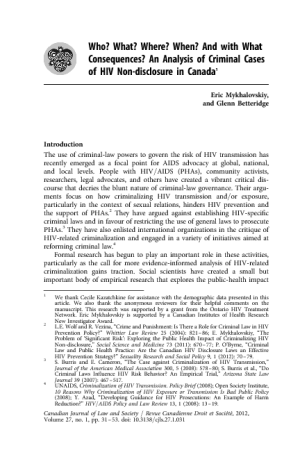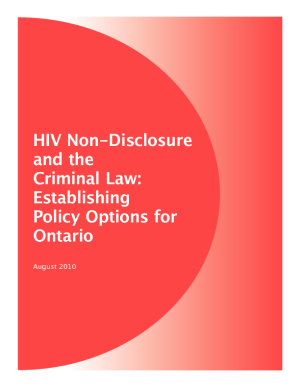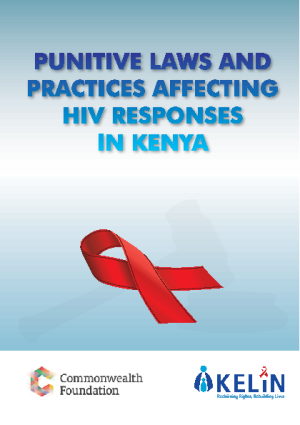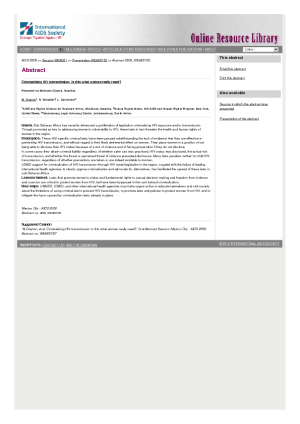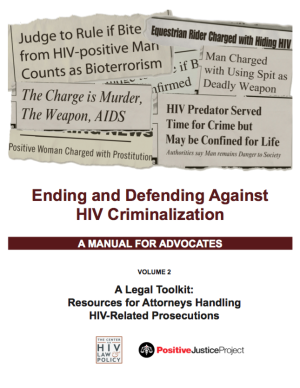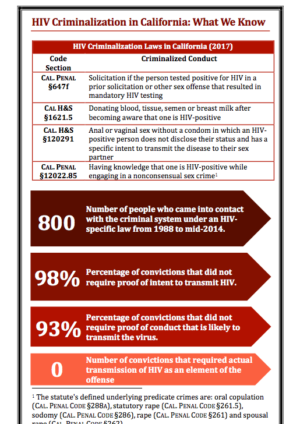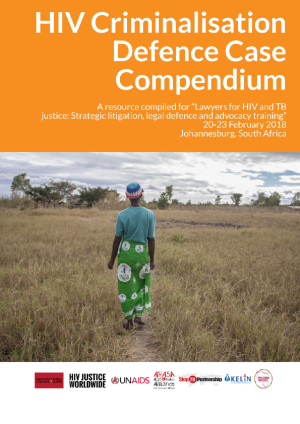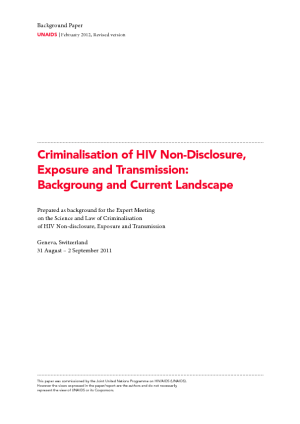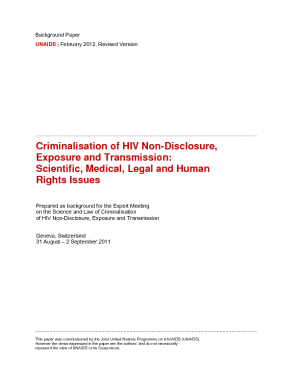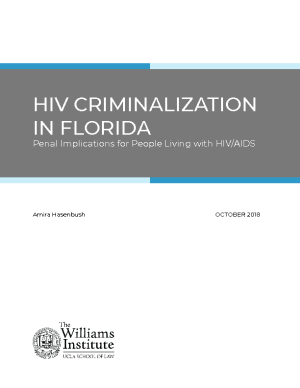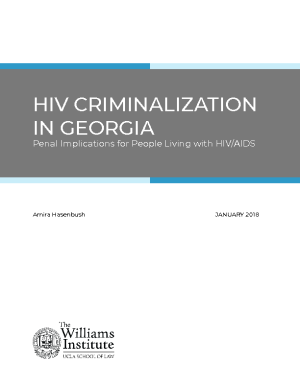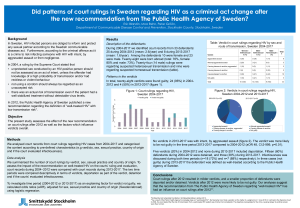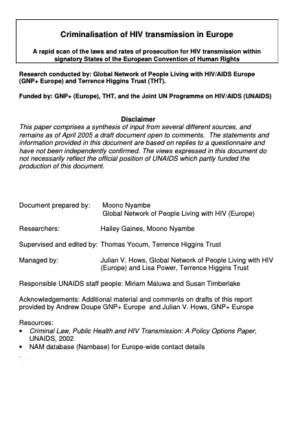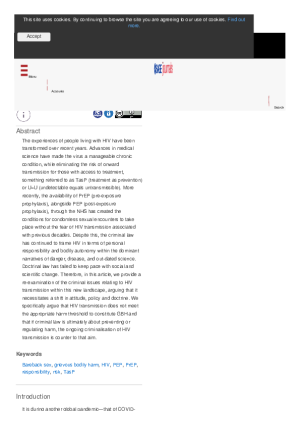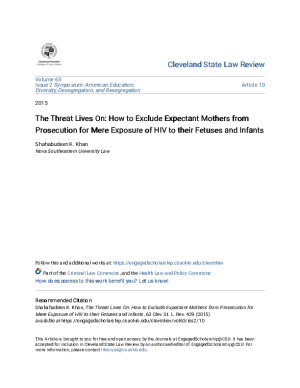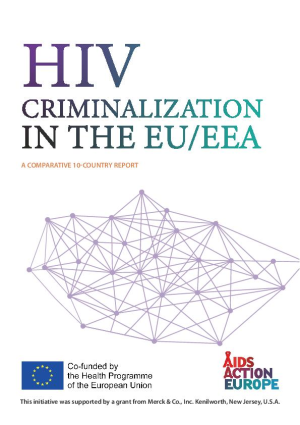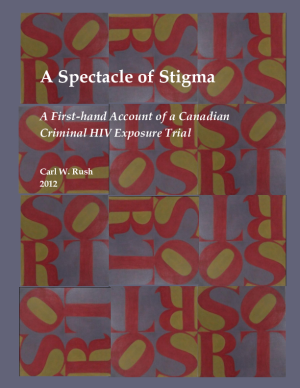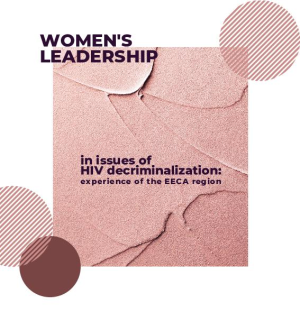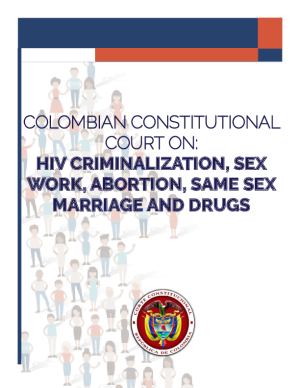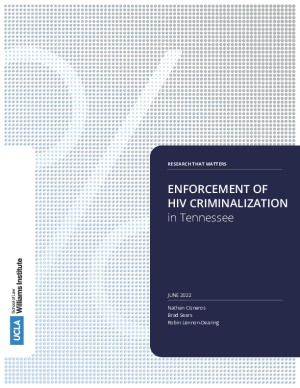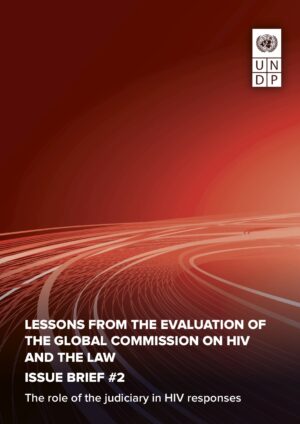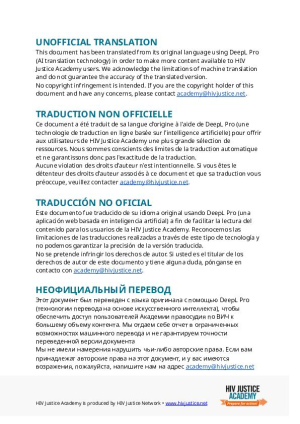Provides global overview of the extent to which criminal and other laws have been used to prosecute people living with HIV for HIV transmission and exposure.
Understanding use of the law to date
These resources outline how laws criminalising HIV have been applied in different jurisdictions. They demonstrate different ways advocates have attempted to pull together an accurate picture of how laws have been used in the past: a process that can strongly inform current advocacy. Resources include academic articles, reports, interviews, indexes and manuals.
“One shouldn´t convict people for hypothetical risks”: developments in criminal law following increased knowledge and awareness of the additional prevention benefit of antiretroviral therapy
Overview of various jurisdictions shows that an increased understanding of the impact of viral load on infectiousness has resulted in a number of jurisdictions revising or revisiting their criminal laws or prosecutorial policies relating to HIV non-disclosure, exposure and/or transmission.
HIV, Crime and the Law in Australia: Options for Policy Reform – a law reform advocacy kit
Divided into two sections, outlines the operation and effect of Australian public health law, criminal law and civil law in relation to HIV related prosecutions. Part 1 – pages 2-13. (Part two, is an advocacy kit including recommendations.)
Legislation Contagion: Building Resiliance
Addresses the sudden introduction of new criminalisation laws in Africa (to 2008).
Who? What? Where? When? And with what consequences?: An analysis of criminal cases of HIV non-disclosure in Canada
Explores the evolution of the criminalization of HIV non-disclosure in Canada, focusing on “criminalization creep”: increasing numbers of people being charged with increasingly severe crimes.
Interview with Cynthia Fromstein
Reports interview with Cynthia Fromstein, a Toronto-based criminal lawyer with experience as a defense lawyer in cases regarding HIV non-disclosure. Discusses her experience with laws around HIV disclosure.
HIV Non-Disclosure and the Criminal Law: Establishing Policy Options for Ontario
Provides an overview and analysis of criminal cases of HIV exposure and transmission to 2010, and proposes policy options for addressing the problems posed by the criminalization of HIV non-disclosure.
“Criminalization Creep”: A brief discussion of the criminalization of HIV/AIDS nondisclosure in Canada
Provides an overview and analysis of criminal cases of HIV exposure and transmission to 2010, and proposes policy options for addressing the problems posed by the criminalization of HIV non-disclosure.
Punitive laws and practices affecting HIV responses in Kenya
Analyses punitive laws and policies undermining the effective delivery of services to PLHIV and those at risk of HIV infection. Flags laws and policies that violate Constitutional rights. Sets out an advocacy agenda for policy and legislative reform and improvement of law enforcement practices and community understanding of criminalisation issues.
Case Analysis: Section 24 of the HIV and AIDS Prevention and Control Act Kenya: Reviewing AIDS Law Project v Attorney General and Another (2015)
Overview of the Kenya High Court’s ground-breaking decision that some terms in the HIV and AIDS Prevention and Control Act were too broadly defined and that Act contravened Kenya’s constitution.
Criminalising HIV transmission: is this what women really need?
Outlines Sub Saharan Africa’s proliferation of legislation criminalizing HIV exposure and/or transmission, highlighting its negative impact on women. Argues UNAIDS, USAID, and other international health agencies must take urgent action to educate lawmakers and civil society about the limitations of criminal law to prevent HIV transmission and the harms of criminalization laws already in place.
Grevious harm: Use of the Offences Against the Person Act 1861 for sexual transmission of HIV
Explores use of the Offences Against the Person Act 1861 to prosecute people who have transmitted HIV infection to sexual partners in England, Wales and Northern Ireland. Examines evidence in cases of sexual HIV transmission and considers the likely impact that criminalising HIV transmission has on public health, especially HIV prevention. Includes recommendations.
Criminal laws on sex work and HIV transmission: Mapping the laws, considering the consequences
Presents a public health law mapping of U.S. states that mandate HIV testing and criminalize HIV positive sex workers. Shows HIV transmission and exposure laws interact with sex work laws to compound criminal penalties for people charged with prostitution related crimes. Argues that decriminalization of sex work and HIV transmission and exposure is integral to effectively address the HIV epidemic.
Case Law Index
Listing of some U.S. HIV prosecutions by case name (to 2013), (pages 7-9)
HIV Criminalization in California: What We Know
Highlights significant findings about Californian criminal law including that more than 800 people have come in contact with California’s criminal system based on their HIV status, with 93% of convictions requiring no proof of conduct likely to transmit HIV. Also finds HIV criminal statutes are disparately enforced based on race/ethnicity, sexuality and gender.
HIV Criminalization in Canada: Key Trends and Patterns
Provides a snapshot of the temporal and demographic patterns of HIV criminalization in Canada from 1989 to 2020, also updating information on the outcomes of criminal cases. Finds people are often convicted in cases involving negligible or no risk of HIV transmission, and that criminal law is increasingly used against people living with HIV from marginalized populations.
HIV Criminalisation Defence Case Compendium
This HIV Criminalisation Defence Case Compendium aims to support lawyers acting for those who are alleged to have put others at risk of HIV. Based on research conducted in late 2017, it includes criminal cases from all over the world where strong defence arguments have resulted in an acquittal or reduced penalty for persons living with HIV who have been accused of HIV exposure, non-disclosure or transmission.
The Compendium is not intended to be comprehensive. It has been developed as a resource for a training of lawyers from Africa – “Lawyers for HIV and TB justice: Strategic litigation, legal defence and advocacy training” – held in Johannesburg, South Africa from 20-23 February 2018.
Criminalisation of HIV Non-Disclosure, Exposure and Transmission: Background and Current Landscape
This paper was commissioned by the UNAIDS Secretariat to serve as a background paper for the Expert Meeting on Criminalisation of HIV Non-Disclosure, Exposure and Transmission, 31 August – 2 September 2011, Geneva, Switzerland.
Criminalisation of HIV Non-Disclosure, Exposure and Transmission: Scientific, Medical, Legal and Human Rights Issues
This paper was commissioned by the UNAIDS Secretariat to serve as a background paper for the Expert Meeting on Criminalisation of HIV Non-Disclosure, Exposure and Transmission, 31 August – 2 September 2011, Geneva, Switzerland. It synthesises general considerations concerning issues raised by the application of the criminal law to non-disclosure, exposure or transmission in relation to HIV Scientific, Medical, Legal and Human Rights Issues.
Rethinking Criminalization of HIV Exposure — Lessons from California’s New Legislation
Argues that laws criminalising HIV exposure fail to satisfy criminal law functions of retribution and deterrence. Retribution is problematic as laws are applied when no intention to transmit HIV, little to no likelihood of transmission and multiple factors may make disclosure difficult. Laws fail to deter unprotected sex and are a poor fit for acts that include no risk of transmission, including sex and blood donation. Instead, laws cause harm, with discriminatory enforcement compounding injustice and stigma. California’s law reform is commendable, while other problematic U.S. HIV-criminalisation statutes should be restructured, amended, or repealed.
HIV Criminalization in Florida – Penal Implications for People Living with HIV/AIDS
Provides an overall understanding of the enforcement of HIV criminalization laws in Florida and assesses any preliminary findings indicating disparities between subpopulations. Preliminary analyses found that there is evidence of disparities in enforcement of HIV criminalization laws related to geography, race/ethnicity, sex at birth, or sex worker (or suspected sex worker) status and underlying related offenses.
HIV Criminalization and Sex Work in California
This study analyses the California Department of Justice criminal history data on arrests of people who had felony solicitation while HIV-positive from 2005 to 2013 and compared the demographics and frequencies with arrest data on sex work over the same time period. Findings indicate a clear disproportionate representation of Black women among those arrested for sex work, in the context of HIV and in general.
HIV Criminalization in Georgia: Penal Implications for People Living with HIV/AIDS
Analyses how HIV criminalisation laws in Georgia have been utilised and assesses preliminary findings on disparities between sub-populations. Found that there might be disparities in enforcement of HIV Criminalisation laws related to geography, race/ethnicity, sex at birth or sex worker (or suspected sex worker) status.
Did patterns of court rulings in Sweden regarding HIV as a criminal act change after the new recommendation from The Public Health Agency of Sweden?
The study assesses the effect of the new recommendations from the Public Health Agency of Sweden on court rulings after 2012 as well as the factors which influence verdicts overall.
GNP+ and THT. Criminalisation of HIV transmission in Europe: A rapid scan (2005)
This paper, prepared by Moono Nyambe at GNP+, and managed by Julian Hows (GNP+) and Lisa Power (Terrence Higgins Trust) comprised a synthesis of input from several different sources, pubished in April 2005 as a draft document open to comments. The statements and information provided in this document are based on replies to a questionnaire and have not been independently confirmed. The views expressed in this document do not necessarily reflect the official position of UNAIDS which partly funded its production.
Respondents from 41 out of 45 countries provided information for the study. Of the respondents from the 41 countries that were able to provide information, it was reported that in at least 36 countries the actual or potential transmission of HIV can constitute a criminal offence. This supported anecdotal evidence that increasingly the law is seen as a tool for regulating conduct that can lead to HIV transmission. In 21 of these countries, it was reported that at least one person has been prosecuted.
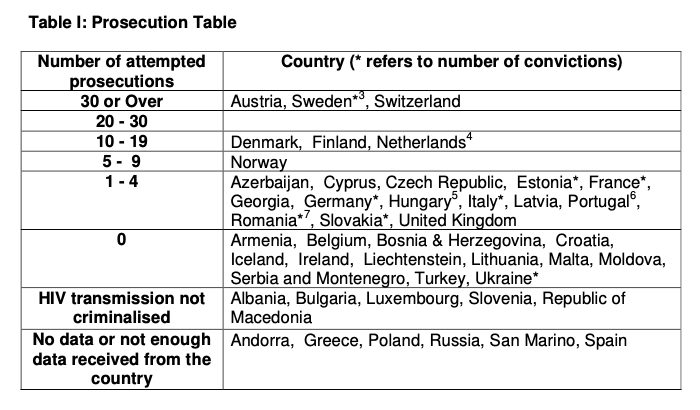
Bareback Sex in the Age of Preventative Medication: Rethinking the ‘Harms’ of HIV Transmission
This article provides a re-examination of the criminal issues relating to HIV transmission within the new landscape of advances in medical science and availability of PrEP and PEP, arguing that it necessitates a shift in attitude, policy and doctrine. It specifically argue that HIV transmission does not meet the appropriate harm threshold to constitute GBH and that if criminal law is ultimately about preventing or regulating harm, the ongoing criminalisation of HIV transmission is counter to that aim.
Understanding Criminal Prosecutions for Sexual Transmission of Infection
A report on charges of grievous bodily harm via sexual transmission of infection handled by the Crown Prosecution Service in England and Wales between 2008-2012, their management and outcomes.
The Threat Lives On: How to Exclude Expectant Mothers from Prosecution for Mere Exposure of HIV to their Fetuses and Infants (2015)
This article articulates how the threat of prosecution of mothers living with HIV who expose or transfer the virus to their foetuses or newborn will discourage and scare women away from seeking proper medical treatment instead of encouraging HIV treatment and prevention. It also explores how HIV-specific criminal transmission laws in the United States could hamper and stifle the progress in prevention and treatment of vertical transmission. It concludes by proposing a model for change in addressing these HIV-specific criminal transmission statutes.
HIV Criminalisation in the EU/EEA: a comparative 10 country report
In 2018-2019 the European HIV Legal Forum conducted a project on HIV-criminalization in 10 EU Member States (Austria, Czechia, Finland, Germany, Greece, Ireland, Italy, Portugal, Romania, and the United Kingdom). The project produced a comparative legal report based on legal survey launched in the 10 countries. One of the main findings of the project showed that regardless of scientific advance in understanding the risk of HIV infection, there is a gap between the scientific knowledge and the understanding of judges, prosecutors and police of the issue due to lack of trainings and national guidelines and media still plays an important but negative role in shaping the discussion around HIV-criminalisation thus sustaining and increasing the stigma against people living with HIV. The report also shows that HIV-criminalisation disproportionately affects key populations, women, people of colour, and the poor and homeless.
Time trends, characteristics, and evidence of scientific advances within the legal complaints for alleged sexual HIV transmission in Spain: 1996–2012
This article quantifies and characterizes existing legal complaints for the sexual transmission of HIV in Spain, describes temporal trends and whether advance of scientific knowledge is reflected in charging decisions, judicial reasoning, and sentences.
Evaluating The Impact of Criminal Laws On HIV Risk Behavior
This article reports on the characteristics and prevalence of HIV-specific criminal exposure and transmission laws, and the enforcement of those laws through prosecutions during the period 1986-2001. It also examines the possible mechanisms through which criminal law influences behavior and considers how these might apply to the specific laws described.
A Spectacle of Stigma
A First-hand Account of a Canadian Criminal HIV Exposure Trial
Women’s Leadership in issues of decriminalization: Experience of the EECA region
The compendium brings together research from the women’s community, examples of documented personal stories and court cases. All the collected materials demonstrate how criminalisation of HIV is a global problem and how it is linked to gender-based violence. Experts believe that criminalising laws do not protect against HIV infection, but only make women worse off in society.
- Alternative links
- Женское лидерство в вопросах декриминализации ВИЧ: опыт региона ВЕЦА
Criminalizing Contagion: Legal and Ethical Challenges of Disease Transmission and The Criminal Law Summary of Key Findings and Outputs (Nov 2014)
This seminar series1 addressed a series of questions and brought together experts from a range of disciplines to answer them. This document summarises the arguments of each of the papers presented over the course of this seminar series, gives details of outputs connected to it, and also provides information on how and by whom we anticipate findings being used.
Colombian Constitutional Court on: HIV Criminalization, Sex Work, Abortion, Same Sex Marriage and Drugs
This document presents some of the most relevant and recent decisions in which the Court has discussed the limits to individual liberty, autonomy and privacy among issues concerning matters like: (i) HIV criminalization and other protections; (ii) sex work; (iii) abortion or voluntary interruption of pregnancy; (iv) rights of same sex couples to marriage; and, (v) personal drug possession and consumption.
Enforcement of HIV Criminalization in Tennessee
Williams Institute analysis of data from the state of Tennessee about individuals who were convicted of an HIV crime and placed on the state’s sex offender registry (SOR). In addition to the registry data, the report also analyses detailed data from 77 case files of those on Tennessee’s SOR who resided and were prosecuted in Shelby County, home of Memphis.
Issue Brief #2: The Role of The Judiciary in The HIV Response
This issue brief shares lessons and reflections on the role of the judiciary in advancing rights-based HIV responses, to inform the implementation of key commitments in the 2021 Political Declaration on HIV and AIDS and the Global AIDS Strategy. These include an understanding of the critical nature of judicial decisions in shaping the HIV-related legal environment; the important legal implications of evolving HIV science; sensitizing judges to people’s lived experiences is key; and safe spaces for respectful discussion and learning among justice sector peers.
Supreme Court, Second Chamber, Criminal Division, Judgment 690/2019 of 11 Mar. 2020, Rec. 1807/2018
INJURY. Transmission of HIV in cases in which the infected person knew of his partner’s disease. The complainant knew that her partner was a carrier of HIV, so having agreed to have sex with him, without any kind of prophylaxis, the transmission of the disease is not worthy of criminal reproach. External evidence of the disease that the complainant had to perceive, since she herself was diagnosed months later, and neither after this diagnosis, nor when she denounced an alleged aggression, did she make any allusion to the contagion of the disease. In dubio pro reo. Self endangerment of the complainant herself.
The SC dismissed the appeal filed against the sentence of the AP Madrid and confirmed the conviction for the crime of aggravated injury due to HIV infection.
This document has been translated from its original language using DeepL Pro (AI translation technology) in order to make more content available to HIV Justice Academy users. We acknowledge the limitations of machine translation and do not guarantee the accuracy of the translated version.


